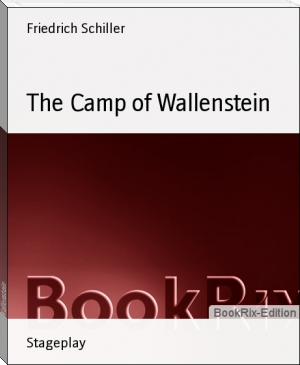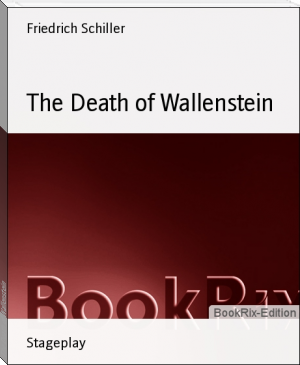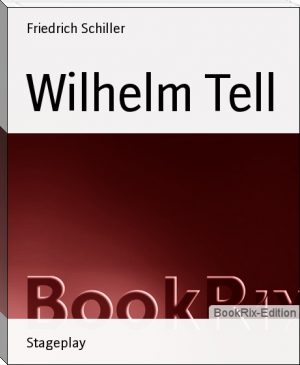The Camp of Wallenstein, Friedrich Schiller [red novels .TXT] 📗

- Author: Friedrich Schiller
Book online «The Camp of Wallenstein, Friedrich Schiller [red novels .TXT] 📗». Author Friedrich Schiller
through it the bullets can make no way.
SERGEANT. 'Tis an ointment of witches' herbs, I say, Kneaded and cooked by unholy spell.
TRUMPETER. No doubt 'tis the work of the powers of hell.
SERGEANT. That he reads in the stars we also hear, Where the future he sees - distant or near - But I know better the truth of the case A little gray man, at the dead of night, Through bolted doors to him will pace - The sentinels oft have hailed the sight, And something great was sure to be nigh, When this little gray-coat had glided by.
FIRST YAGER. Ay, ay, he's sold himself to the devil, Wherefore, my lads, let's feast and revel.
SCENE VII.
The above - Recruit, Citizen, Dragoon.
(The Recruit advances from the tent, wearing a tin cap
on his head, and carrying a wine-flask.)
RECRUIT. To father and uncle pray make my bow, And bid 'em good-by - I'm a soldier now.
FIRST YAGER. See, yonder they're bringing us something new,
CITIZEN. Oh, Franz, remember, this day you'll rue.
RECRUIT (sings).
The drum and the fife,
War's rattling throng,
And a wandering life
The world along!
Swift steed - and a hand
To curb and command -
With a blade by the side,
We're off far and wide.
As jolly and free,
As the finch in its glee,
On thicket or tree,
Under heaven's wide hollow - Hurrah! for the Friedlander's banner I'll follow!
SECOND YAGER. Foregad! a jolly companion, though.
[They salute him.
CITIZEN. He comes of good kin; now pray let him go.
FIRST YAGER. And we wern't found in the streets you must know.
CITIZEN. I tell you his wealth is a plentiful stock; Just feel the fine stuff that he wears for a frock.
TRUMPETER. The emperor's coat is the best he can wear.
CITIZEN. To a cap manufactory he is the heir.
SECOND YAGER. The will of a man is his fortune alone.
CITIZEN. His grandmother's shop will soon be his own.
FIRST YAGER. Pish! traffic in matches! who would do't?
CITIZEN. A wine-shop his grandfather leaves, to boot, A cellar with twenty casks of wine.
TRUMPETER. These with his comrades he'll surely share.
SECOND YAGER. Hark ye, lad - be a camp-brother of mine.
CITIZEN. A bride he leaves sitting, in tears, apart.
FIRST YAGER. Good - that now's a proof of an iron heart.
CITIZEN. His grandmother's sure to die with sorrow.
SECOND YAGER. The better - for then he'll inherit to-morrow.
SERGEANT (advances gravely, and lays his hand on the
Recruit's tin cap). The matter no doubt you have duly weighed, And here a new man of yourself have made; With hanger and helm, sir, you now belong To a nobler and more distinguished throng. Thus, a loftier spirit 'twere well to uphold -
FIRST YAGER. And, specially, never be sparing of gold.
SERGEANT. In Fortune's ship, with an onward gale, My friend, you have made up your mind to sail. The earth-ball is open before you - yet there Naught's to be gained, but by those who dare. Stupid and sluggish your citizen's found, Like a dyer's dull jade, in his ceaseless round, While the soldier can be whatever he will, For war o'er the earth is the watchword still. Just look now at me, and the coat I wear, You see that the emperor's baton I bear - And all good government, over the earth, You must know from the baton alone has birth; For the sceptre that's swayed by the kingly hand Is naught but a baton, we understand. And he who has corporal's rank obtained, Stands on the ladder where all's to be gained, And you, like another, may mount to that height -
FIRST YAGER. Provided you can but read and write.
SERGEANT. Now, hark to an instance of this from me, And one, which I've lived myself to see There's Butler, the chief of dragoons, why he, Whose rank was not higher a whit than mine, Some thirty years since, at Cologne on Rhine, Is a major-general now - because He put himself forward and gained applause; Filling the world with his martial fame, While slept my merits without a name. And even the Friedlander's self - I've heard - Our general and all-commanding lord, Who now can do what he will at a word, Had at first but a private squire's degree; In the goddess of war yet trusting free, He reared the greatness which now you see, And, after the emperor, next is he. Who knows what more he may mean or get?
(Slyly.) For all-day's evening isn't come yet.
FIRST YAGER. He was little at first, though now so great - For at Altorf, in student's gown he played By your leave, the part of a roaring blade, And rattled away at a queerish rate. His fag he had well nigh killed by a blow, And their Nur'mburg worships swore he should go To jail for his pains - if he liked it or no. 'Twas a new-built nest to be christened by him Who first should be lodged. Well, what was his whim? Why, he sent his dog forward to lead the way, And they call the jail from the dog to this day. That was the game a brave fellow should play, And of all the great deeds of the general, none E'er tickled my fancy, like this one.
[During this speech, the second Yager has begun toying
with the girl who has been in waiting.]
DRAGOON (stepping between them). Comrade - give over this sport, I pray.
SECOND YAGER. Why, who the devil shall say me nay!
DRAGOON. I've only to tell you the girl's my own.
FIRST YAGER. Such a morsel as this, for himself alone! - Dragoon, why say, art thou crazy grown?
SECOND YAGER. In the camp to be keeping a wench for one! No! the light of a pretty girl's face must fall, Like the beams of the sun, to gladden us all.
(Kisses her.) DRAGOON (tears her away). I tell you again, that it shan't be done.
FIRST YAGER. The pipers are coming, lads! now for fun!
SECOND YAGER (to Dragoon). I shan't be far off, should you look for me.
SERGEANT. Peace, my good fellows! - a kiss goes free.
SCENE VIII.
Enter Miners, and play a waltz - at first slowly, and
afterwards quicker. The first Yager dances with the girl,
the Sutler-woman with the recruit. The girl springs away,
and the Yager, pursuing her, seizes hold of a Capuchin
Friar just entering.
CAPUCHIN. Hurrah! halloo! tol, lol, de rol, le! The fun's at its height! I'll not be away! Is't an army of Christians that join in such works? Or are we all turned Anabaptists and Turks? Is the Sabbath a day for this sport in the land, As though the great God had the gout in his hand, And thus couldn't smite in the midst of your band? Say, is this a time for your revelling shouts, For your banquetings, feasts, and holiday bouts? Quid hic statis otiosi? declare Why, folding your arms, stand ye lazily there? While the furies of war on the Danube now fare And Bavaria's bulwark is lying full low, And Ratisbon's fast in the clutch of the foe. Yet, the army lies here in Bohemia still, And caring for naught, so their paunches they fill! Bottles far rather than battles you'll get, And your bills than your broad-swords more readily wet; With the wenches, I ween, is your dearest concern, And you'd rather roast oxen than Oxenstiern. In sackcloth and ashes while Christendom's grieving, No thought has the soldier his guzzle of leaving. 'Tis a time of misery, groans, and tears! Portentous the face of the heavens appears! And forth from the clouds behold blood-red, The Lord's war-mantle is downward spread - While the comet is thrust as a threatening rod, From the window of heaven by the hand of God. The world is but one vast house of woe, The ark of the church stems a bloody flow, The Holy Empire - God help the same! Has wretchedly sunk to a hollow name. The Rhine's gay stream has a gory gleam, The cloister's nests are robbed by roysters; The church-lands now are changed to lurch-lands; Abbacies, and all other holy foundations Now are but robber-sees - rogues' habitations. And thus is each once-blest German state, Deep sunk in the gloom of the desolate! Whence comes all this? Oh, that will I tell - It comes of your doings, of sin, and of hell; Of the horrible, heathenish lives ye lead, Soldiers and officers, all of a breed. For sin is the magnet, on every hand, That draws your steel throughout the land! As the onion causes the tear to flow, So vice must ever be followed by woe - The W duly succeeds the V, This is the order of A, B, C. Ubi erit victoriae spes, Si offenditur Deus? which says, How, pray ye, shall victory e'er come to pass, If thus you play truant from sermon and mass, And do nothing but lazily loll o'er the glass? The woman, we're told in the Testament, Found the penny in search whereof she went. Saul met with his father's asses again, And Joseph his precious fraternal train, But he, who 'mong soldiers shall hope to see God's fear, or shame, or discipline - he From his toil, beyond doubt, will baffled return, Though a hundred lamps in the search he burn. To the wilderness preacher, th' Evangelist says, The soldiers, too, thronged to repent of their ways, And had themselves christened in former days. Quid faciemus nos? they said: Toward Abraham's bosom what path must we tread? Et ait illis, and, said he, Neminem concutiatis; From bother and wrongs leave your neighbors free. Neque calumniam faciatis; And deal nor in slander nor lies, d'ye see? Contenti estote - content ye, pray, Stipendiis vestris - with your pay - And curse forever each evil way. There is a command - thou shalt not utter The name of the Lord thy God in vain; But, where is it men most blasphemies mutter? Why here, in Duke Friedland's headquarters, 'tie plain If for every thunder, and every blast, Which blazing ye from your tongue-points cast, The bells were but rung, in the country round, Not a bellman, I ween, would there soon be found; And if for each and every unholy prayer Which to vent from your jabbering jaws you dare, From your noddles were plucked but the smallest hair, Ev'ry crop would be smoothed ere the sun went down, Though at morn 'twere as bushy as Absalom's crown. Now, Joshua, methinks, was a soldier as well - By the arm of King David the Philistine fell; But where do we find
SERGEANT. 'Tis an ointment of witches' herbs, I say, Kneaded and cooked by unholy spell.
TRUMPETER. No doubt 'tis the work of the powers of hell.
SERGEANT. That he reads in the stars we also hear, Where the future he sees - distant or near - But I know better the truth of the case A little gray man, at the dead of night, Through bolted doors to him will pace - The sentinels oft have hailed the sight, And something great was sure to be nigh, When this little gray-coat had glided by.
FIRST YAGER. Ay, ay, he's sold himself to the devil, Wherefore, my lads, let's feast and revel.
SCENE VII.
The above - Recruit, Citizen, Dragoon.
(The Recruit advances from the tent, wearing a tin cap
on his head, and carrying a wine-flask.)
RECRUIT. To father and uncle pray make my bow, And bid 'em good-by - I'm a soldier now.
FIRST YAGER. See, yonder they're bringing us something new,
CITIZEN. Oh, Franz, remember, this day you'll rue.
RECRUIT (sings).
The drum and the fife,
War's rattling throng,
And a wandering life
The world along!
Swift steed - and a hand
To curb and command -
With a blade by the side,
We're off far and wide.
As jolly and free,
As the finch in its glee,
On thicket or tree,
Under heaven's wide hollow - Hurrah! for the Friedlander's banner I'll follow!
SECOND YAGER. Foregad! a jolly companion, though.
[They salute him.
CITIZEN. He comes of good kin; now pray let him go.
FIRST YAGER. And we wern't found in the streets you must know.
CITIZEN. I tell you his wealth is a plentiful stock; Just feel the fine stuff that he wears for a frock.
TRUMPETER. The emperor's coat is the best he can wear.
CITIZEN. To a cap manufactory he is the heir.
SECOND YAGER. The will of a man is his fortune alone.
CITIZEN. His grandmother's shop will soon be his own.
FIRST YAGER. Pish! traffic in matches! who would do't?
CITIZEN. A wine-shop his grandfather leaves, to boot, A cellar with twenty casks of wine.
TRUMPETER. These with his comrades he'll surely share.
SECOND YAGER. Hark ye, lad - be a camp-brother of mine.
CITIZEN. A bride he leaves sitting, in tears, apart.
FIRST YAGER. Good - that now's a proof of an iron heart.
CITIZEN. His grandmother's sure to die with sorrow.
SECOND YAGER. The better - for then he'll inherit to-morrow.
SERGEANT (advances gravely, and lays his hand on the
Recruit's tin cap). The matter no doubt you have duly weighed, And here a new man of yourself have made; With hanger and helm, sir, you now belong To a nobler and more distinguished throng. Thus, a loftier spirit 'twere well to uphold -
FIRST YAGER. And, specially, never be sparing of gold.
SERGEANT. In Fortune's ship, with an onward gale, My friend, you have made up your mind to sail. The earth-ball is open before you - yet there Naught's to be gained, but by those who dare. Stupid and sluggish your citizen's found, Like a dyer's dull jade, in his ceaseless round, While the soldier can be whatever he will, For war o'er the earth is the watchword still. Just look now at me, and the coat I wear, You see that the emperor's baton I bear - And all good government, over the earth, You must know from the baton alone has birth; For the sceptre that's swayed by the kingly hand Is naught but a baton, we understand. And he who has corporal's rank obtained, Stands on the ladder where all's to be gained, And you, like another, may mount to that height -
FIRST YAGER. Provided you can but read and write.
SERGEANT. Now, hark to an instance of this from me, And one, which I've lived myself to see There's Butler, the chief of dragoons, why he, Whose rank was not higher a whit than mine, Some thirty years since, at Cologne on Rhine, Is a major-general now - because He put himself forward and gained applause; Filling the world with his martial fame, While slept my merits without a name. And even the Friedlander's self - I've heard - Our general and all-commanding lord, Who now can do what he will at a word, Had at first but a private squire's degree; In the goddess of war yet trusting free, He reared the greatness which now you see, And, after the emperor, next is he. Who knows what more he may mean or get?
(Slyly.) For all-day's evening isn't come yet.
FIRST YAGER. He was little at first, though now so great - For at Altorf, in student's gown he played By your leave, the part of a roaring blade, And rattled away at a queerish rate. His fag he had well nigh killed by a blow, And their Nur'mburg worships swore he should go To jail for his pains - if he liked it or no. 'Twas a new-built nest to be christened by him Who first should be lodged. Well, what was his whim? Why, he sent his dog forward to lead the way, And they call the jail from the dog to this day. That was the game a brave fellow should play, And of all the great deeds of the general, none E'er tickled my fancy, like this one.
[During this speech, the second Yager has begun toying
with the girl who has been in waiting.]
DRAGOON (stepping between them). Comrade - give over this sport, I pray.
SECOND YAGER. Why, who the devil shall say me nay!
DRAGOON. I've only to tell you the girl's my own.
FIRST YAGER. Such a morsel as this, for himself alone! - Dragoon, why say, art thou crazy grown?
SECOND YAGER. In the camp to be keeping a wench for one! No! the light of a pretty girl's face must fall, Like the beams of the sun, to gladden us all.
(Kisses her.) DRAGOON (tears her away). I tell you again, that it shan't be done.
FIRST YAGER. The pipers are coming, lads! now for fun!
SECOND YAGER (to Dragoon). I shan't be far off, should you look for me.
SERGEANT. Peace, my good fellows! - a kiss goes free.
SCENE VIII.
Enter Miners, and play a waltz - at first slowly, and
afterwards quicker. The first Yager dances with the girl,
the Sutler-woman with the recruit. The girl springs away,
and the Yager, pursuing her, seizes hold of a Capuchin
Friar just entering.
CAPUCHIN. Hurrah! halloo! tol, lol, de rol, le! The fun's at its height! I'll not be away! Is't an army of Christians that join in such works? Or are we all turned Anabaptists and Turks? Is the Sabbath a day for this sport in the land, As though the great God had the gout in his hand, And thus couldn't smite in the midst of your band? Say, is this a time for your revelling shouts, For your banquetings, feasts, and holiday bouts? Quid hic statis otiosi? declare Why, folding your arms, stand ye lazily there? While the furies of war on the Danube now fare And Bavaria's bulwark is lying full low, And Ratisbon's fast in the clutch of the foe. Yet, the army lies here in Bohemia still, And caring for naught, so their paunches they fill! Bottles far rather than battles you'll get, And your bills than your broad-swords more readily wet; With the wenches, I ween, is your dearest concern, And you'd rather roast oxen than Oxenstiern. In sackcloth and ashes while Christendom's grieving, No thought has the soldier his guzzle of leaving. 'Tis a time of misery, groans, and tears! Portentous the face of the heavens appears! And forth from the clouds behold blood-red, The Lord's war-mantle is downward spread - While the comet is thrust as a threatening rod, From the window of heaven by the hand of God. The world is but one vast house of woe, The ark of the church stems a bloody flow, The Holy Empire - God help the same! Has wretchedly sunk to a hollow name. The Rhine's gay stream has a gory gleam, The cloister's nests are robbed by roysters; The church-lands now are changed to lurch-lands; Abbacies, and all other holy foundations Now are but robber-sees - rogues' habitations. And thus is each once-blest German state, Deep sunk in the gloom of the desolate! Whence comes all this? Oh, that will I tell - It comes of your doings, of sin, and of hell; Of the horrible, heathenish lives ye lead, Soldiers and officers, all of a breed. For sin is the magnet, on every hand, That draws your steel throughout the land! As the onion causes the tear to flow, So vice must ever be followed by woe - The W duly succeeds the V, This is the order of A, B, C. Ubi erit victoriae spes, Si offenditur Deus? which says, How, pray ye, shall victory e'er come to pass, If thus you play truant from sermon and mass, And do nothing but lazily loll o'er the glass? The woman, we're told in the Testament, Found the penny in search whereof she went. Saul met with his father's asses again, And Joseph his precious fraternal train, But he, who 'mong soldiers shall hope to see God's fear, or shame, or discipline - he From his toil, beyond doubt, will baffled return, Though a hundred lamps in the search he burn. To the wilderness preacher, th' Evangelist says, The soldiers, too, thronged to repent of their ways, And had themselves christened in former days. Quid faciemus nos? they said: Toward Abraham's bosom what path must we tread? Et ait illis, and, said he, Neminem concutiatis; From bother and wrongs leave your neighbors free. Neque calumniam faciatis; And deal nor in slander nor lies, d'ye see? Contenti estote - content ye, pray, Stipendiis vestris - with your pay - And curse forever each evil way. There is a command - thou shalt not utter The name of the Lord thy God in vain; But, where is it men most blasphemies mutter? Why here, in Duke Friedland's headquarters, 'tie plain If for every thunder, and every blast, Which blazing ye from your tongue-points cast, The bells were but rung, in the country round, Not a bellman, I ween, would there soon be found; And if for each and every unholy prayer Which to vent from your jabbering jaws you dare, From your noddles were plucked but the smallest hair, Ev'ry crop would be smoothed ere the sun went down, Though at morn 'twere as bushy as Absalom's crown. Now, Joshua, methinks, was a soldier as well - By the arm of King David the Philistine fell; But where do we find
Free e-book «The Camp of Wallenstein, Friedrich Schiller [red novels .TXT] 📗» - read online now
Similar e-books:





Comments (0)